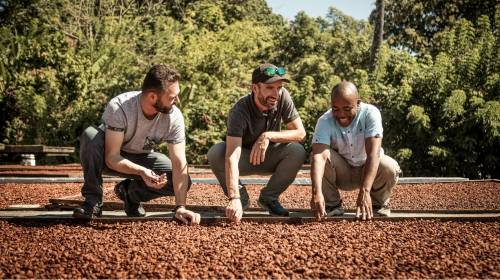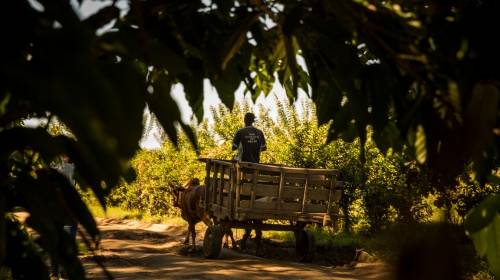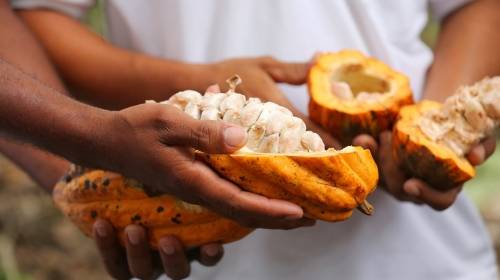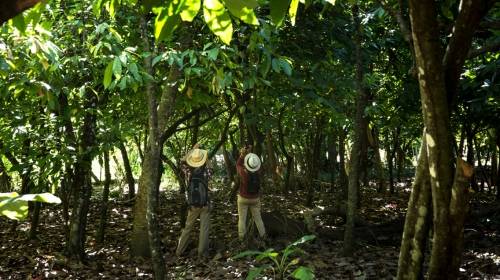The sourcing expert profession
What is a sourcing expert? It is a profession that is as little-known as it is essential for the cocoa industry and chocolate production! Valrhona employs 4 of them. We met one of them, Julien Desmedt, who has been a passionate sourcer for almost 10 years.

Sourcing at Valrhona
The sourcing expert unearths and maintains relations with cocoa producers in different countries around the world. Internally, they work closely with the quality department, sales representatives, Research & Development and the Corporate Social Responsibility department, in which they play a crucial role. Valrhona’s “Live Long” Sustainability program consists of 4 pillars (cocoa, the environment, gastronomy and all our stakeholders). The sourcing team runs and supplies the cocoa pillar, with projects benefiting its partners and the surrounding communities.
In theory, its role stops when cocoa beans are delivered to the chocolate factory and production takes over. But Valrhona’s sourcing expert had worn many hats before working at the Tain l’Hermitage site! As a brand ambassador and a fervent supporter of producers, they are a link between the two to establish a partnership based on trust and a win-win relationship. “Our business has two essential focuses,” explains Julien Desmedt. “First of all, there is pure sourcing, i.e. the monitoring that we carry out to find our future partners, assess market trends and listen to the sector. Then there is the development of partnerships with the cocoa producers we work with. In this area, we support them as they move towards better societal and environmental practices and we help them to develop projects that facilitate the daily lives of communities whose lives depend on this cocoa cultivation," he explains.
A day in the life of a sourcing expert
At Valrhona, a sourcing expert spends 30 to 40% of their time traveling and meets with producers in the countries they work with at least once a year. “It’s quite strenuous!” laughs Julien Desmedt, who is preparing to leave for the Dominican Republic. There, he will meet no fewer than ten stakeholders to carry out projects and maintain a network that he will then have to sustain. “The time spent traveling, by plane or by car, as well as the time differences are sometimes difficult to manage but it’s all part of the job!”

Our sourcing expert concedes that it’s definitely worth it: “Each time, we are welcomed into these countries with the same energy, positive attitude and ambition that we bring with us. We are working in a meaningful sector. We are here to develop projects and to defend our vision of respect, transparency and sustainability. Every journey is a timeless moment that reminds us of how lucky we are to work in this field. Visits to farms, participation in international conferences, meetings with stakeholders, project implementation and monitoring; the scope of a sourcing expert’s activities is as wide as the range of people they meet. “This is another very interesting aspect of our business: we interact with all the links in the sector, both upstream and downstream: growers, representatives from States and NGOs, but also restaurateurs, pastry chefs and all those who work with our finished products.” A global vision that Julien describes as both exciting and rewarding. When they are not on the ground, the sourcing staff work at Tain L’Hermitage, where they take stock of their trips, prepare for the next ones, talk to the other divisions of the brand, participate in trade fairs, meet Valrhona customers, etc. These tasks may be less strenuous, but they are essential to their activities.”

The qualities required of a good sourcing expert
While, strictly speaking, there are no “sourcing expert” training courses at Valrhona, these jobs are carried out by agronomists. They are specialists in many fields, with an adventurous spirit, a strong sensitivity to the environmental and societal challenges of the world and with experience in the countries in which they will work. They are flexible, and able to adapt to the different situations they encounter. They are curious and responsive, and quickly understand the challenges of the country in which they are located and are easily able to grasp the big picture. “We also need to be patient because our work considers the long term, relatively speaking,” adds Julien. “It takes an average of 5 years for a partnership to be concluded between a cocoa producer and Valrhona. This is the time it takes to get to know each other, understand what is expected of the other person, build a climate of trust and create a beautiful product,” he says. “It takes time to develop sustainable partnerships, like the one we have had with the Millot plantation for over 30 years,” he concludes.
Rigorous and humane selection of cocoa producers
Valrhona works with cocoa producers who share its vision and ambitions when it comes to product quality and sustainability. With a few exceptions, Valrhona does not have an exclusivity agreement with its cooperatives. They all have other customers, allowing them to maintain their independence and ensure their financial sustainability. There are some fifty cocoa-producing countries in the world.

To date, Valrhona purchases 0.15% of worldwide production from 15 of them. “A figure is subject to change,” comments Julien: “We develop new partnerships with new countries when it is possible to set up there and this is relevant for Valrhona.” For a cocoa producer to become a partner, it must obviously offer an interesting and aromatic profile that we are looking for internally or bring something new to the brand. This sometimes gives rise to some wonderful discoveries: “la cuvée du sourceur”, for example, which is a firm favorite, a rare chocolate product or one that stands out from the crowd, offered on a single-estate basis or on a terroir within a single estate. These cuvées are offered exclusively to certain customers and may eventually become Grands Crus. “Kilti 66% is one of those cuvées,” says Julien. “It is a pure Haiti chocolate with fruity and camphoraceous notes that deserves to be discovered by as many people as possible! In any case, it’s my firm favorite,” he said. “As well as offering exceptional taste and texture, it is the result of a great partnership between Valrhona and Feccano, a cooperative located in the north of the island, comprising a thousand producers.” For a Valrhona sourcing expert, the taste of chocolate is as important as the story it tells and the values it stands for!
 Microsoft Edge
Microsoft Edge
 Google Chrome
Google Chrome
 Mozilla Firefox
Mozilla Firefox
 Opéra
Opéra


